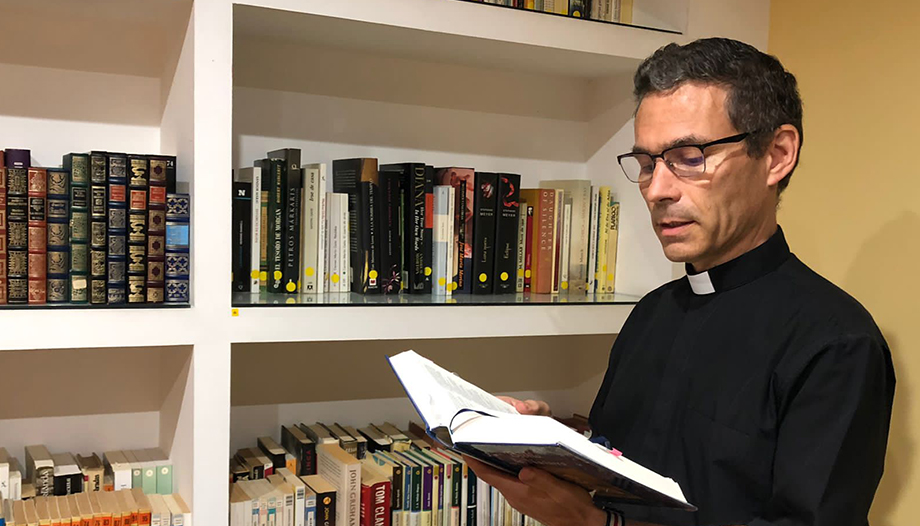The first question, obviously, focuses on the purpose of the Reasons section, one of the most valued sections of Omnes and of which you are the author. How do you approach the section? What points would you highlight?
-The section has gone through different stages and profiles over a number of years. Currently, more particularly since March of this year, the profile of the section is similar to a brief lectio divina. S
A Scripture text (often a single verse) is presented, its context is given, and some other biblical passage that points in the same direction as the text presented.
The final objective is to offer a possible updating of the fragment so that the reader may feel challenged by the words of Scripture. This is aided by some simple questions that invite reflection on the subject and some brief quotations taken from the living tradition of the Church that comment on the text.
The Omnes section aims to bring Scripture closer to the Catholic faithful, with accessible language and a sapiential approach to the sacred text.
Josep Boira
What is the internal organization of the section and its objectives?
-At this stage, two authors are in charge of the section, alternating each month. Logically, each author has his own style, but the common objective of the section is to bring Scripture closer to the Catholic faithful, with an accessible language, with a sapiential look at the sacred text that helps to understand and discover its perennial novelty, and therefore its relevance for a better understanding of the world in which we live.
In his Apostolic Letter "Scriptura Sacrae Affectus."In the words of Dei Verbum, the Pope recalled that "if the Bible is 'like the soul of sacred theology' and the spiritual backbone of Christian religious practice, it is indispensable that the act of interpreting it be supported by specific skills" How does one approach the study and explanation of Sacred Scripture based on these skills?
-In the same exhortation of the Second Vatican Council. Dei Verbum The guidelines for a correct interpretation are given: "Since Sacred Scripture must be read and interpreted with the same spirit with which it was written in order to draw out the exact meaning of the sacred texts, it is necessary to pay no less diligent attention to the content and unity of the whole of Sacred Scripture, taking into account the living Tradition of the whole Church and the analogy of faith". These criteria summarize the way to approach the study of the Bible. It is wonderful to discover the analogies within the Bible, the interconnections, the fulfillments of the figures.
How can we not be amazed to discover that the prophet Elisha had already multiplied the loaves, foreshadowing in some way what Jesus did? Even more: after the multiplication of the loaves, we see Jesus praying and then walking on the wind-stirred waters.
The attentive reader can go beyond Elisha and see in Jesus the creator God, who hovers over the waters and saves men from the dark waters. A professor used to tell me with great accuracy that the Bible is the first hypertextmillennia before the technology of linking texts together existed.

Sometimes we Catholics are reproached by our Protestant brethren for a "lack of knowledge" of Sacred Scripture. Is this true? Are we really aware of the importance of the Word of God and of applying it in our lives?
-Thank God, for a long time now there have been many initiatives in the Catholic Church that encourage the faithful to have a loving knowledge of Scripture, at the parish and academic levels; the new technologies have also opened the Bible to many people. Some of the initiatives come from the Roman Pontiffs. Pope Francis has recently written us a precious Apostolic Letter, which you have just quoted: Scrupturae Sacrae Affectus, (whose reading I recommend) on the occasion of the XVI centenary of the death of St. Jerome. Previously, he established the Sunday of the Word of God.
Perhaps some of these initiatives have arisen following the example of our brethren in the evangelical churches. Undoubtedly, there is much to be done, and we will never be able to say that we have done it all, for Scripture will always remain the soul of theology and "the spiritual backbone of religious practice," as the Pope's aforementioned letter states.
The saints are the best interpreters of Scripture because they transcend the written text and arrive, through it, at an encounter with Jesus Christ.
Josep Boira
Do you think that now that we have easy access to the texts of saints and Church Fathers, we can take advantage of this legacy to enter into Sacred Scripture and incorporate it into our prayer?
- We could say that the saints are the best interpreters of Scripture because, with the help of the Holy Spirit, they have been able to transcend the written text and arrive, through it, at an encounter with Jesus Christ. They are our teachers so that the Bible becomes our principal book of prayer.







